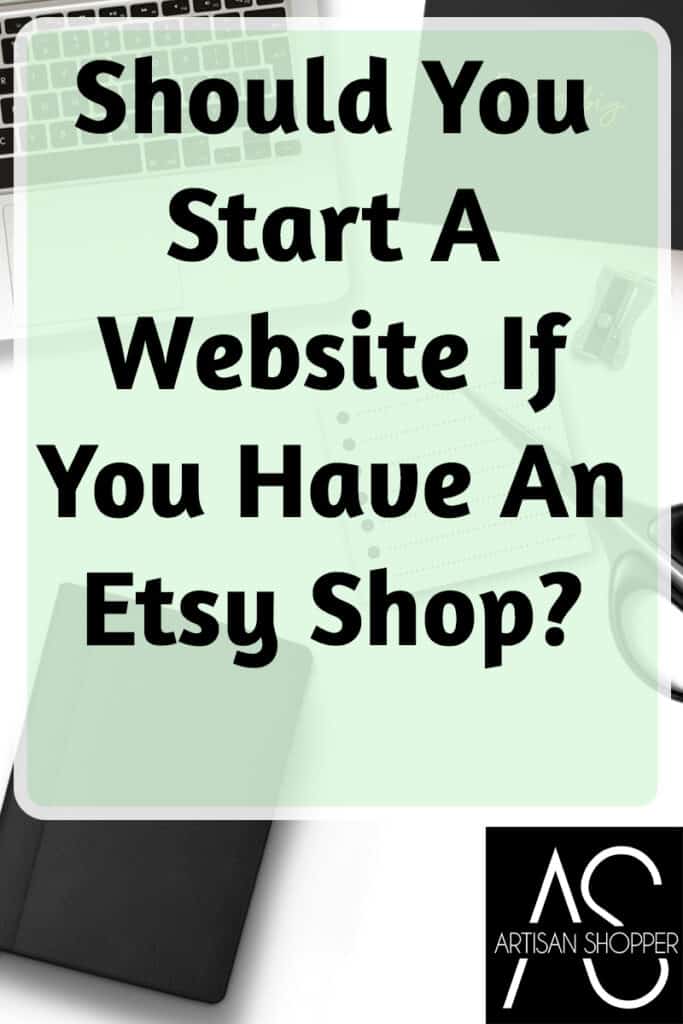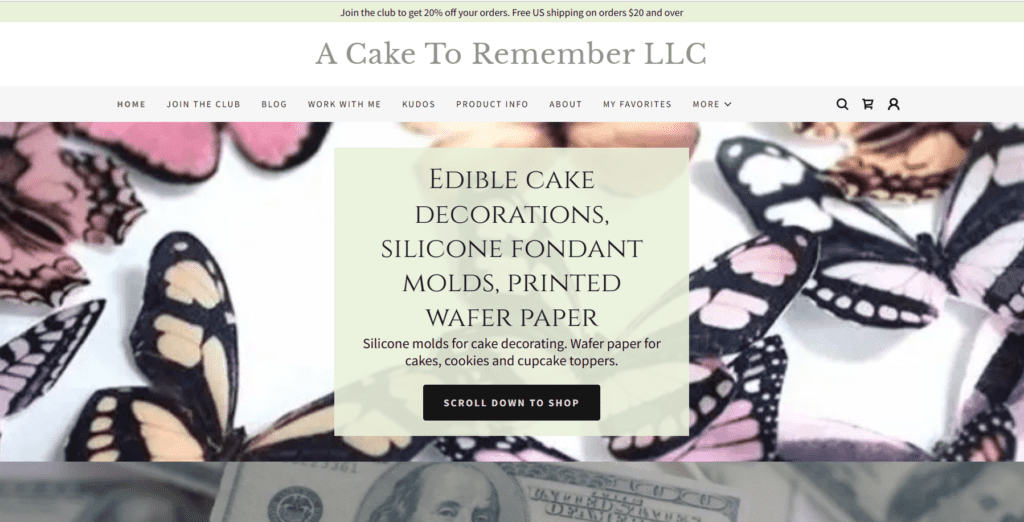If you have an Etsy shop that you rely on for income, you definitely need to also have a website for your business. There are no ifs, ands, or buts about it, because if you have a business you need to have a presence on a platform that you control.
I hear a lot of objections from people about this, but it’s too important to procrastinate about.
Let’s talk about why you should add a website to your business presence online.

Table of Contents
- What are the benefits of having a website for your home-based business?
- Should I sell on my website right away?
- What service should I use to make a website?
- How much does it cost to start a website?
- What can you do with a website that you can’t do on Etsy?
Some of the links in this article are affiliate links that will pay a small commission if they’re used to purchase something. To see the entire affiliate policy click here.
What are the benefits of having a website for your home-based business?
Controlling your own shop.
The main reason that you need to have your own website is to have control over where you sell. If you use any third-party marketplace you’ll always be running the risk of having your shop shut down for whatever reason, and that can wreck your income if you don’t have another way to sell to people.
Building a brand.
You’ll also be able to build a brand for your business, which is difficult to do if you only sell on Etsy or another marketplace.
People tend to think “I bought that on Etsy” instead of “I bought that from (your business name here.)”
Having a website will let you train customers to think of your business as a business, not just as a part of the larger platform.
Keeping more of your profits.
Selling from your own website will probably allow you to keep more of your profits, because you won’t be paying the fees that a platform would charge you.
I say “probably,” though, because you’ll still have to pay for the website hosting or the plugins that you want to use.
You’ll also have to pay for any payment processing fees from sales that you make, since that’s something that you have to pay regardless of where you sell online. That’s a fee that the banks and credit card companies charge.
Until you start generating sales on your website it might cost you more to have it than you’re getting back, but if you keep on with it that will flip eventually.
Building domain authority.
Because websites have to deal with Google search instead of just focusing on Etsy search, you’ll need to build your authority with Google to have your website be seen. This involves doing a lot of things, but having a domain name that’s registered online and pointing to a website is one of the things that can help Google recognize your site.
The longer your URL is online, the more authority it builds up over time.
Even if you start a website and only have a few pages on it to begin with, it’s better to start now instead of waiting until you’re desperate for a site, since it takes Google 8-12 months to really start ranking your site.
Should I sell on my website right away?
If you don’t want to sell products on your website right away (or ever) that’s totally fine. A lot of Etsy sellers start websites and have a link to their Etsy shops for the product section of it. This lets Etsy act like your cash register, and there are other advantages to doing it that way.
For an article about linking your website to your Etsy shop, click here.
Let Etsy handle the sales taxes.
One advantage to letting Etsy be your selling platform, even though you have a separate website for the main part of your site, is that Etsy collects and remits sales tax in most places.
That means that they’ll figure all of the taxes out for you, and that’s a big piece of work that will be taken off of your plate.
I have a website that I sell my cake decorations on, but for my digital keyword lists, I put those on Etsy because digital products can be sold anywhere in the world.
That means that I would have to deal with sales and VAT taxes if I qualified for that, and I have no desire to think about that!
The Etsy fees that I pay because I’m selling on Etsy and not on my website are more than fair when I think about how much work I would have to be doing as far as figuring out the tax part of it.
Keeping everything in one place.
Another reason why people wouldn’t want to sell directly from their own websites to start out is that it’s one less thing to monitor.
If all of your orders are processed through one source, it’s a lot easier to manage.
Start building website authority for the future.
The other advantage of building a website even if you’re not going to sell products right away is that the website will still be building authority with Google.
If you do eventually want to start selling on your website it will have had time to get “known” to Google and it won’t be as hard to get traffic organically.
But what if you do want to start selling products right away…What kind of things should you know about and how does that affect your choice of website builder? Read on for that info.
What service should I use to make a website?
If you do decide to build your own website you don’t have to do it from scratch, you can use a service like Shopify, Wix, Square, or other platforms to build one. If you decide to create your own website from scratch that’s certainly do-able, but using a template makes it easier, especially if you’re not tech-savvy.
I’m not going to get into the pros and cons of each service in this article, but in general, these are things to consider when you’re deciding where to build your website:
Building a site using WordPress.
The main difference between doing it yourself using WordPress plus an e-commerce plugin vs using a template is that you’ll be the one to have to fix problems if the DIY site has a problem.
If you’re not comfortable dealing with that kind of tech issue, it might be better for you to use Shopify, Wix, Square, or another website template service that has shop templates built in.
I had a WordPress website where I had my EShop program and other classes hosted and I sold them from that site, but I got tired of dealing with all of the problems and I switched to Teachable. They handle everything including the sales tax for various countries, so it’s worth it to me to pay them to do that.
The time that it was taking me to deal with selling from my WordPress site was irritating, so for me it wasn’t a good option.
If you want total control, and you’re comfortable with dealing with the backend world of plugins and that kind of thing, WordPress is probably the best option.
I wrote another in-depth article about WordPress for e-commerce websites, you can read that here: Should I use WordPress for my website?
Building a site using a shop-builder platform.
I mentioned using a platform like Shopify, Square, Wix, and others that are available to create an e-commerce site, and doing that is probably the easiest for most people.
These sites are specifically for people to build e-commerce sites, and most of them are set up to make integrating payments and product listings pretty easy.
If you’re not super technical, this kind of platform is probably good for you because the templates don’t involve having to deal with code, and you can usually find plugins to import your Etsy listings even if you have to edit them later.
It’s important to check into the specifics for each service, though, since they’re all slightly different.
I’ll be writing another article with the pros and cons of some different platforms, and will link to that when it’s done.
Should you use Etsy’s Pattern website builder?
Etsy has its own website builder tool called Pattern, but I wouldn’t recommend it for a few reasons.
Having said that, I do know people who use it and like it. But the point I keep coming back to is that if you’re trying to get off of Etsy, you should get off of Etsy.
Don’t stay with an Etsy website if you’re trying to escape from the Etsy platform.
But then again, Pattern websites do integrate with your Etsy shop, so if you sell something in one place the inventory will sync on the other, and that’s convenient for people who sell in person.
You’ll have to decide for yourself where you want to sell, but I would advise just getting off of Etsy completely for a website setup.
How much does it cost to start a website?
The answer to the question of cost is “it depends,” because each platform has different costs, and you might have to pay for plugins and extras if you start with a cheap service. It can add up quickly, but in general the cost of running a website is going to be far less than the fees that you’d be paying on Etsy once you get some sales going.
Most website services have a monthly fee, whether it’s for hosting a WordPress site or paying for a templated site like Shopify.
I pay $320 a year for my website hosting including the URL registration (I’ll write about the service I use and why I DO NOT recommend it in another article!)
By comparison, I would have paid Etsy $1062 in transaction fees to sell the same number of things that I sold on my website. (That doesn’t include listing fees, either.)
So I basically saved $740 in fees (and more if you count listing fees) by selling those things on my website and not on Etsy.
The cost of paying for a website might seem high to begin with, but it’s not in the long run.
One thing I’ll add is that if you do decide to go through WordPress to host your website, you’ll need to choose a hosting company.
A lot of people will recommend Bluehost, but that’s often because they’re getting affiliate referrals to do that! Bluehost gets very mixed reviews from actual users as far as I’ve seen, and a lot of people who have used them say to avoid them.
I use Cloudways to host my WordPress blogs , this one included, and I’ve only heard people say good things about it. I like their service and how flexible it is to match what people need for their individual sites.
, this one included, and I’ve only heard people say good things about it. I like their service and how flexible it is to match what people need for their individual sites.
What can you do with a website that you can’t do on Etsy?
If you have a website you can build your brand, develop trust with Google for organic search, and blog about your products. You can also have photo galleries of your work, embed long videos from Youtube, and generally build trust and recognition a lot better than you can on Etsy.
Blogging for your business.
Having a blog on a website will give you a way to show your expertise and answer questions for your customers. This builds trust with them and with Google, and the blog is also a way to link to your products.
I have a blog on my cake website and I use it to write general “how to” articles about cake decorating, and I also link to my products from the blog.
This gives customers another way to find my products, and it also helps Google find them.
If you’re interested in using your blog to build your e-commerce website, you should join my membership group for people who are basically competing against themselves with both a website and an Etsy shop: Google SEO Club .
.
The problem with having a website and an Etsy shop is that you will be competing against yourself on Google, because Etsy has a much bigger footprint and will usually outrank your site in search results.
But you can outrank Etsy by doing very specific things, it just takes time!
Blogging is a really good way to get your foot in the door with Google, and by doing that you’ll get your products to rank higher over time, too.
Embed YouTube videos.
Adding videos from your YouTube channel is another way to show Google that you have expertise and experience with your products.
By adding video you’ll also be giving yourself another possible result in Google search, since they like video results for certain search queries.
Having videos on your website will also give your customers a central hub to find your products, blog posts (you can add the videos to blog posts, too) and videos showing your products.
That will increase the trust that they have for you, and that in turn can increase sales.
Add a photo gallery.
You can add a page for a photo gallery on your website if you want to display specific products, kind of like a portfolio.
These photos can then link to the products themselves, or you can add photos of you at different craft shows and in other places to show that you’re a real person who’s really making the things that you’re selling.
The more photos that you have the better, since people will trust you more if they see you actually making things.
The main reason why you need a website for your business is that it’s good to have a place online that you own, you control, and you run yourself. It takes the fear of being shut down, having payment reserves slapped on your shop, and having listings removed, and it gives you the control.
If you’re not ready for a full-on e-commerce site yet that’s fine, but I really do suggest that you set up a domain name and a basic website as a waiting room, so to speak, until you do want to set something up!
It can only help you in the long run, and even if you do it bit by bit, it’s better than not doing it at all.


